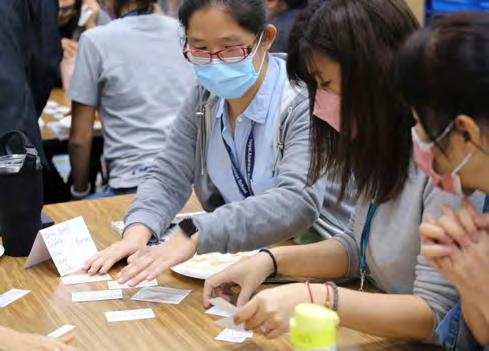
1 minute read
Building A Comprehensive and Inclusive Learning Environment for Students and Teachers
By Lower School EAL and Mandarin Team
The lower school has embraced the TAS goal to build a welcoming environment for multicultural and multilingual students, faculty, staff, and their families by expanding its professional development opportunities into multiple languages. For example, in the fall of 2022, the TAS Lower School Mandarin and EAL Departments collaborated to host a workshop for Mandarin speakers as part of a professional learning commitment to work towards inclusivity for multilingual learners.
and all participants’ languages to share ideas and communicate learning. “It’s not just those labeled as ’EAL’ students who benefit from strategies Honigsfeld recommends, like language scaffolds in every classroom, but all multilingual learners in our community have the opportunity to thrive,” Blais said.
Participants of this workshop shared that the discussion in Mandarin helped them to clarify key concepts and understand how they can transfer to our context at TAS.
“We must notice many of our young learners are multilingual learners. Therefore, we aim to provide our students with a safe and warm learning environment where they can feel comfortable and confident to share their thoughts,” Ms. Hsiao said.
The participants were encouraged by this multilingual workshop and recognized that it allowed all educators access to the same learning experiences. They look forward to transferring what they learned to their classrooms – providing access for all their multilingual learners.
This year, the lower school is reading Dr. Andrea Honigsfeld’s book “From Equity Insights to Action: Critical Strategies for Teaching Multilingual Learners” and meeting with her quarterly to look more closely at multilingualism at TAS.
One clear message from the book is that language plays an essential role in developing our personal identities; the learning experiences we provide for students impact how our students develop their identities.
Strategies like translanguaging, using all the languages available to an individual to communicate ideas and learning, are deliberate, daily actions that can positively impact learning and our students’ cultural and linguistic identities.
After recent feedback from Mandarin-speaking teachers and teaching assistants about Honigsfeld’s book, which is only available in English, the lower school administration decided to put translanguaging into action and offered a workshop in Mandarin.

The workshop was conducted in English and Mandarin and co-facilitated by lower school EAL teachers Virginia Blais, Lulu Chen, and Mayuko Perkins and lower school Mandarin teachers Rachel Wang, Karen Wang ‘03, and Amanda Hsiao. They covered the same topics previously shared by Honigsfeld, using strategies for multilingual learners











